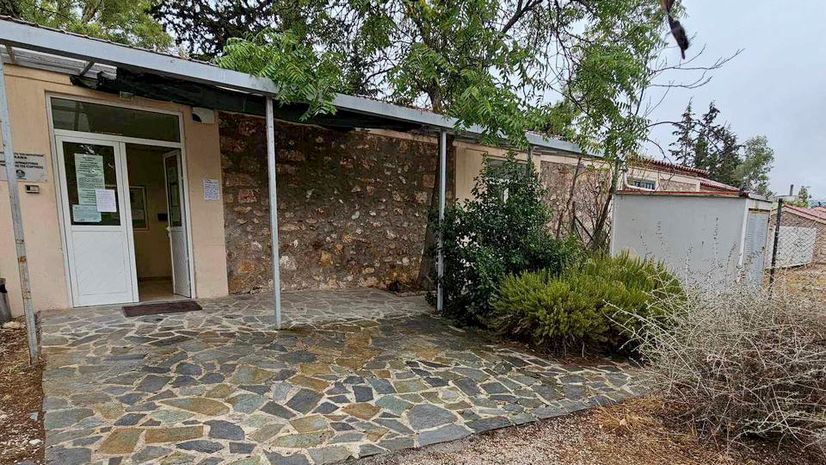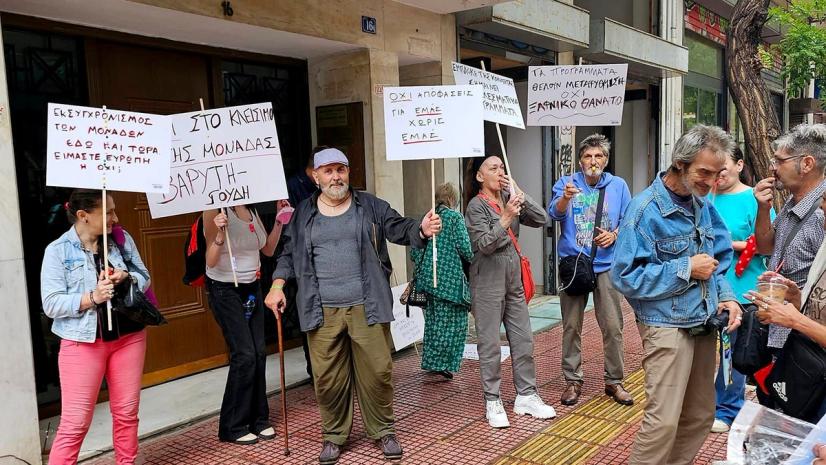Service users and allies stage protest - PeerNUPS
Closure of harm reduction units in Greece: Austerity politics trumping community empowerment?
By Christos Anastasiou (PeerNUPS / EuroNPUD) & Juan Fernández Ochoa (IDPC)
The recent decision by OKANA, the Greek government’s agency for drug services, to close seven harm reduction units, including one in Goudi (Athens), has raised serious concerns among service users, healthcare professionals and advocates. In the following lines, we delve into the implications of these closures; highlight the importance of preserving and expanding, not shrinking, harm reduction provision; and urge national and international authorities to prioritise the needs of people who use these services.
The Goudi harm reduction clinic is highly regarded by service users. Contrary to many other harm reduction units in Greece, it operates as a standalone building located in a park, which provides a certain degree of privacy and a green environment. Moreover, clients allude to the importance of the clinic’s superior treatment compared to the temporary and often makeshift harm reduction units that operate in the corners of hospitals, where medical attention is reported as widely unavailable or at best occasional. Crucially, the Goudi unit provides access to methadone. As such, the clinic is held as a sanctuary for those seeking support in relation to their opioid use.
Photo: The entrance of the Goudi clinic in Athens
OKANA’s rationale for this ‘restructuring’ appears to prioritise cost-savings and austerity politics over scientific evidence, or the well-being and needs of people who use these services. The fact that service users have offered to cover the clinic’s rent themselves emphasises its significance in their lives.
Methadone, an essential medicine according to the World Health Organization, is an integral treatment for opioid dependence. However, access to methadone in Greece is already limited to a couple of cities (Athens and Thessaloniki) and the closure of units providing this lifesaving treatment risks shrinking this access even further. It is also concerning that colleagues have pointed out that these closures may reflect national health authorities’ inclination for the provision of buprenorphine, which despite its wider availability, is not the preference of many service users.
As a joint statement by the European Network of People who Use Drugs (EuroNPUD) and the Greek Peer Network of Users of Psychoactive Substances (PeerNUPS) states, these closures are deeply concerning and may have grave consequences. Harm reduction units often serve as points of contact for broader health and welfare services, and reduced access to opioid agonist therapy may increase the risk of withdrawal, overdose, transmissible infections and reliance on a volatile and highly costly street drug supply. Against the backdrop of recent concentrated epidemics among people who inject drugs in Greek urban centres, these closures sound a powerful alarm.
Furthermore, the closure of these units is also taking place without adequate consultation with service users, contradicting European quality standards for patient-oriented care that stress the importance of patients’ empowerment. As such, the decision follows a logic of hierarchical compliance, rather than one of concordance, where the relationship between the medical institution and patients seeks to create a therapeutic alliance between equals.
In a recent article on addressing challenges related to the use of opioids, WHO authorities commended Greece’s response, highlighting the importance of naloxone and methadone. Paradoxically, the closure of these units will weaken that very methadone provision.
The closure of these harm reduction centres not only hinders effective opioid dependence management, but also endangers broader public health and community well-being goals. As such, it demands immediate attention from harm reductionists, international public bodies, and drug policy advocates. Halting these closures until meaningful consultations with service users and a thorough review of the decision can take place is crucial to ensure the wellbeing of people who use drugs and safeguarding the health of everyone in our communities.
‘Nothing about us without us’, ever.
Please, consider signing this petition to Save OAT Clinics in Athens and sharing this information with relevant networks and authorities.
Photo: Service users and allies demonstrate against the closures.
Regions
Related Profiles
- Greek Peer Network of Users of Psychoactive Substances (PeerNUPS)
- International Drug Policy Consortium (IDPC)
- European Network of People who Use Drugs (EuroNPUD)


